Several safety rule breaches, including not wearing proper protective gear while conducting experiments, led to a researcher working at an Academia Sinica laboratory handling the COVID-19 virus to become infected with the disease, an investigative report showed.
The researcher is a woman in her 20s who worked until early this month in a lab at Academia Sinica’s Genomics Research Center. She began to show symptoms of COVID-19 late last month, and a test she took on Dec. 9 came back positive.
Based on genome sequencing results, the Central Epidemic Command Center (CECC) concluded that the laboratory in Taipei’s Nangang District (南港) where she worked was the origin of the infection, which raised questions about whether current safety protocols were adequate in preventing potential transmission and whether the laboratory had breached any of the protocols in place.

Photo: Fang Pin-chao, Taipei Times
In the wake of the incident, Academia Sinica was ordered to conduct an internal investigation, and a 28-page report on its findings was sent to the CECC on Sunday.
According to a summary of the report released by the CECC on Monday, Academia Sinica identified three reasons that the researcher had been exposed to the virus, based on interviews with people who worked there, laboratory records and surveillance footage of the lab.
Researchers are only allowed to handle COVID-19 infected mice in biosafety cabinets, but this rule was breached, resulting in several areas in the lab becoming contaminated, the summary said.
The researcher infected with COVID-19 also took off her mask before removing the rest of her protective gear, which was not the correct order of removal.
Moreover, the researcher and her colleagues failed to wear proper protective gear — including N95 masks, two sets of gloves, and safety goggles — while conducting experiments, the summary said.
As a result, the researcher was directly exposed on several occasions to the virus while wearing inadequate protective gear, which could have resulted in her becoming infected with the disease, although she could also have been infected because she had removed her gear in the wrong order, it said.
Academia Sinica said that it would review its supervisory system for its laboratories that handle sensitive materials, and that it would boost training for research personnel.
The CECC plans to meet with an independent investigation committee looking into the incident on Thursday and release its findings, including what punishments are to be handed out, in two weeks, it said.
The laboratory has been temporarily barred from using infectious biological materials and might only resume their use after obtaining approval from the Centers of Disease Control, the CECC said.
None of the infected researcher’s contacts have tested positive for COVID-19, the CECC said.

POSITIVE DEVELOPMENT: Japan and the US are expected to hold in-depth discussions on Taiwan-related issues during the meeting next month, Japanese sources said The holding of a Japan-US leaders’ meeting ahead of US President Donald Trump’s visit to China is positive news for Taiwan, former Japan-Taiwan Exchange Association representative Hiroyasu Izumi said yesterday. After the Liberal Democratic Party’s landslide victory in Japan’s House of Representatives election, Japanese Prime Minister Sanae Takaichi is scheduled to visit the US next month, where she is to meet with Trump ahead of the US president’s planned visit to China from March 31 to April 2 for a meeting with Chinese President Xi Jinping (習近平). Japan and the US are expected to hold in-depth discussions on Taiwan-related issues during the

‘LIKE-MINDED PARTNER’: Tako van Popta said it would be inappropriate to delay signing the deal with Taiwan because of China, adding he would promote the issue Canadian senators have stressed Taiwan’s importance for international trade and expressed enthusiasm for ensuring the Taiwan-Canada trade cooperation framework agreement is implemented this year. Representative to Canada Harry Tseng (曾厚仁) in an interview with the Central News Agency (CNA) said he was increasingly uneasy about Ottawa’s delays in signing the agreement, especially as Ottawa has warmed toward Beijing. There are “no negotiations left. Not only [is it] initialed, we have three versions of the text ready: English, French and Mandarin,” Tseng said. “That tells you how close we are to the final signature.” Tseng said that he hoped Canadian Prime Minister Mark Carney

President William Lai (賴清德) yesterday bestowed one of Taiwan’s highest honors on Saint Vincent and the Grenadines (SVG) Ambassador Andrea Clare Bowman in recognition of her contributions to bilateral ties. “By conferring the Order of Brilliant Star with Grand Cordon on Ambassador Bowman today, I want to sincerely thank her, on behalf of the Taiwanese people, for her outstanding contribution to deepening diplomatic ties between Taiwan and SVG,” Lai said at a ceremony held at the Presidential Office in Taipei. He noted that Bowman became SVG’s first ambassador to Taiwan in 2019 and

A man walks past elementary school artworks at the Taipei Lantern Festival in Ximen District yesterday, the first day of the event. The festival is to run from 5pm to 10pm through March 15.